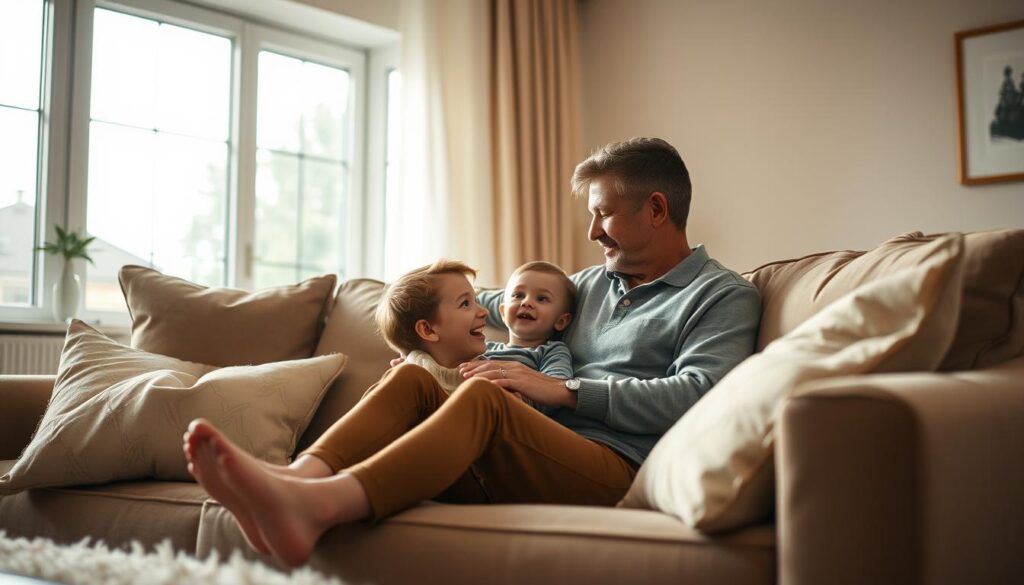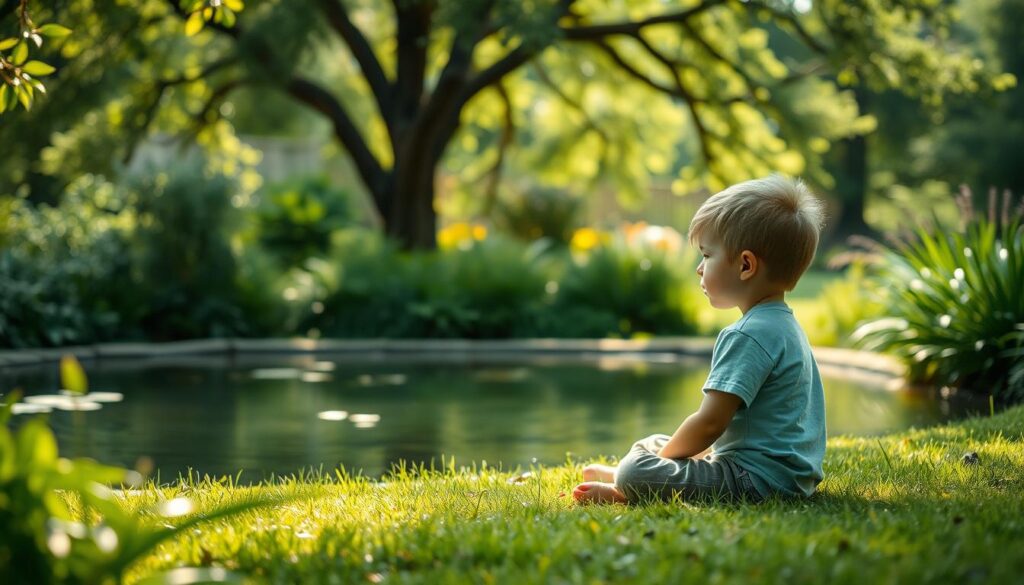Ever thought there’s a gentler way to guide your child? Positive discipline is it. It’s about setting limits with kindness and understanding. This method teaches important lessons and makes your bond stronger.
It’s all about creating a caring space. This way, your kids learn to control themselves and feel their feelings. Let’s learn how to raise our children with love and respect.
- Positive discipline promotes understanding instead of punishment.
- Setting boundaries with respect and empathy is key for good parenting.
- This method helps kids learn to manage themselves.
- Positive parenting makes your relationship with your child stronger.
- A caring environment helps kids feel better emotionally.
Understanding Discipline vs. Punishment
When we talk about parenting, it’s key to know the difference between discipline and punishment. Discipline teaches and guides your child to better behavior. It uses respect and empathy to help them understand rules.
Punishment, on the other hand, uses fear or control. This can make kids follow rules because they’re scared, not because they understand them.
Studies show that kids who are raised with respect do better in learning morals and values. Using positive discipline helps kids see why certain behaviors are important. It’s not just about following rules to avoid getting in trouble.
Setting clear rules and talking with empathy helps kids develop their moral compass. They learn why rules are important and how to follow them. This way, kids grow up in a supportive and healthy environment.
The Importance of Respect and Empathy in Parenting

Using respect and empathy in parenting helps your child grow. It teaches them to value themselves and others. This makes them feel understood and valued, helping their emotional intelligence grow.
Showing empathy means being kind and understanding. When you talk to your child with respect, you teach them how to communicate well. This helps avoid fights and makes them stronger when things get tough.
Being respectful helps your child make good friends and get along with adults. It teaches them to handle their feelings in a healthy way. This makes your family’s emotional health better.
Positive Discipline: Setting Boundaries with Respect and Empathy

Using positive discipline means setting healthy boundaries with kindness and understanding. This way, kids feel loved and supported, even when they can’t do everything. By explaining the reasons for rules, kids learn why they’re important.
Empathetic discipline is key. It’s about listening to your child’s feelings and showing you care. When kids feel heard, they’re more likely to listen and follow rules.
Here are some ways to use positive discipline:
- Communicate the rules clearly and provide rationale.
- Recognize and validate your child’s emotions.
- Encourage cooperative problem-solving.
- Focus on emotional development and support.
These methods help shape your child’s behavior in a caring way. It’s a balance of respect and emotional growth.
The Two Core Principles of Positive Discipline

Learning about positive discipline can change how you parent. It focuses on respect and empathy for your child’s feelings and who they are. When you listen to their feelings, they feel safe to share without worry of getting in trouble.
Building a strong connection with your child is key. A good bond helps you talk openly. This bond teaches kids that their actions matter, but they feel supported too. Using positive discipline, you help your kids learn and grow, not just punish them.
Effective Discipline Strategies for Parents

Using good discipline strategies can change how you parent. Start by making clear rules. Kids do better when they know what’s expected.
Use empathetic language to show you get their feelings. This builds trust and makes talking about choices easier.
Letting kids choose between two things is a great way to teach them. It makes them feel in charge. Explain why they have to make certain choices and what happens if they don’t.
This helps kids learn to make good choices on their own. It makes them more responsible and able to control themselves.
Using these methods can reduce fights over rules. Kids are more willing to listen when they understand why they’re doing something. Try to guide them instead of bossing them, and your home will be happier.
Practical Techniques for Positive Discipline

Using positive reinforcement is a great start. It shows kids when they do something good. This makes them want to do it again.
It’s also good to use visual cues. Charts or pictures can help kids understand rules better. This can make things clearer and smoother.
Try using “when-then” statements. It’s like saying, “Finish your homework, then you can play outside.” It sets clear rules and helps kids feel responsible.
Talking about rules and choices is key. It helps you both understand each other better. This can make things less stressful and more cooperative.
Acknowledge Emotions in Boundary-Setting
When setting boundaries with kids, it’s key to acknowledge emotions. Recognizing and validating their feelings helps a lot. Parents should know that kids feel things deeply, like frustration or sadness.
By listening well, you make your child feel heard and understood. This is very important.
Talking in a way that shows you care can stop fights before they start. Instead of just saying the rule, talk about how they feel. This makes them feel their feelings are important.
It also helps them learn about emotional intelligence. When kids feel their feelings are heard, they’re more likely to accept the rules.
- Use reflective listening by saying back what your child says.
- Validate their feelings with phrases like “I can see that you are upset.”
- Ask open-ended questions that let your child share more.
Studies show that knowing and feeling emotions helps kids deal with tough times better. By using these tips, you build a better, more caring relationship with your child.
Building Healthy Parent-Child Relationships

Creating strong bonds with your child is key. It helps make a supportive place. Talking openly and making your child feel safe to share is important.
Family meetings help everyone have a say. This makes your child feel heard and trusted. Setting clear rules helps everyone understand what’s expected.
Showing you listen and care about their feelings is vital. It makes them feel valued. A good relationship with your child helps them grow and learn.
Using Empathetic Communication with Children

Empathetic communication is key to setting boundaries and expectations. It makes kids feel valued and heard. Using polite words helps create a positive vibe.
Listening well is important. Give your child your full attention when they talk. Saying you understand their feelings makes them more open to you.
Being empathetic helps kids listen better. When they feel you get them, they’re more likely to follow rules. This builds a strong base for respectful talks.
Using these methods can make your relationship better. It’s all about showing respect and understanding. This helps kids behave better in the future.
Growing Self-Regulation Through Positive Discipline Techniques

It’s important to help your child grow self-regulation. Using positive discipline helps them see how their actions affect them. This helps them learn and grow emotionally.
Logical consequences work well. When kids see what happens because of their actions, they learn to control themselves better. For example:
- Letting them face the natural results helps them learn.
- Helping them solve problems makes them think more.
- Letting them help decide teaches them responsibility.
As kids practice these skills, they get better at managing their feelings and actions. Teaching them to set boundaries helps them understand their emotions. By supporting their growth, you give them tools for success all their lives.
Fostering Empathy in Parenting

It’s key to build strong bonds with your kids by showing empathy. When you act with kindness, they learn to value feelings. They see how important emotions are in our interactions.
By listening to what they say and feel, you show you care. This helps them understand that their feelings matter.
Using positive discipline helps too. Role-playing lets kids see things from another’s view. They learn how their actions affect others.
This helps them grow into caring people. They learn to be kind and respectful in all their relationships.
Choosing connection over control makes parenting better. It helps you build strong, healthy bonds with your kids. This way, they grow up in a place filled with understanding and care.
This approach doesn’t just fix problems now. It also builds trust and respect for the future. These are key for your child’s success.
Discipline is a journey, not a quick fix. By adding one positive strategy each week, you’ll see big changes. Your child will learn important skills like self-control and emotional smarts.
Positive discipline makes parenting rewarding and lasting. By using these methods, you create a space where respect and connection grow. This helps your child become a kind and balanced person.

